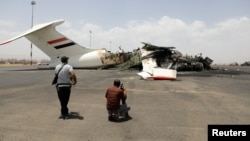For the past decade, Yemen has stood as one of the world’s gravest humanitarian disasters, with more than 20 million people -- over half the population -- in need of aid.
Now funding cuts, US and Israeli air strikes, and new sanctions are intensifying an already dire situation, according to aid groups and experts.
In January, the United States redesignated the Iranian-backed Houthis, who control Yemen’s most populous areas, as a foreign terrorist organization. Two months later, it halted all US humanitarian aid to the country.
Simultaneously, US and Israeli forces launched strikes on ports and airports in an effort to disrupt Houthi supply chains after the group fired drones and missiles at American and Israeli targets.
“It is almost impossible for any humanitarian organization to bring food and aid to Houthi-controlled areas because banks don’t want to get in trouble with the US government over sanctions violations,” said Bernd Kaussler, a professor at James Madison University and Yemen expert.
“The cutting-off of aid and designating the Houthis a terrorist organization -- that has really condemned all Yemenis to an absolute catastrophe,” he said.
This week, ahead of the seventh Humanitarian Senior Officials Meeting in Brussels, more than 110 aid organizations urged world leaders to ramp up support for Yemen, warning that 2025 could be the worst year since the civil war erupted in 2014.
The UN’s $2.48 billion Yemen Humanitarian Response Plan for 2025 was less than 10 percent funded going into the May 22 meeting. The European Union pledged €80 million ($91 million) at the summit but that still leaves the plan less than 15 percent funded with seven months to go.
A Nation in Collapse
Yemen, the poorest country in the Middle East, descended into civil war in 2014 when the Houthis seized the capital, Sanaa, ousting the internationally recognized Sunni government.
The group now controls much of the northwest, including Red Sea ports like Hodeidah that are lifelines for food and fuel.
Years of fighting have devastated the economy, pushed millions to the brink of famine, and left more than half of the 377,000 conflict-related deaths in the first seven years of war tied to hunger or lack of medical care, according to the UN.
Nearly half of all Yemeni children under 5 are stunted due to malnutrition, the UN said.
Kaussler described the long-term impact on children as “extraordinary,” warning that many may never fully recover.
Until recently, the United States was Yemen’s largest donor, contributing nearly $5.9 billion in aid over the past decade -- more than triple that of the EU. But that support has now stopped.
Soon after taking office, President Donald Trump moved to dismantle the US Agency for International Development, redirecting foreign humanitarian and developmental aid to align with policy goals. Although most humanitarian programs were later reinstated, Yemen and Taliban-controlled Afghanistan were excluded.
In cutting off Yemen, US officials voiced concerns that aid was being diverted by the Houthis, who control access to aid within the territory they hold.
Kaussler acknowledged the risk but said cutting aid would backfire, adding it further destabilizes a country in an already volatile region, while also creating space for China to increase its soft-power footprint.
Aid Blocked and Bombed
The new US sanctions have forced multiple aid groups to suspend operations in Houthi-held territory, Amnesty International said. Islamic Relief, a UK-based charity, said sanctions have disrupted banking access and fund transfers, and urged exemptions to allow life-saving aid to get through.
Meanwhile, US and Israeli strikes have targeted Houthi-held infrastructure in retaliation for attacks on Red Sea shipping and periodic missile fire on Israel. The port of Hodeidah and Sanaa airport -- which Israel says are used by the Houthis to import and transfer weapons -- were among the sites hit.
In a May 20 statement, Islamic Relief warned that hitting critical infrastructure “not only deepens economic and psychological hardship but also hinders humanitarian workers’ ability to reach the most vulnerable.”
The Houthis have also undermined aid delivery.
In June 2024, they arrested 13 UN staff and several other aid workers during coordinated raids. Human rights groups say the Houthis since 2014 have arbitrarily detained and tortured hundreds of civilians, including humanitarian workers, many of whom have never been seen again.
That has had a chilling effect on aid organizations operating or seeking to operate in Yemen.
‘The Forgotten War’
As Yemen’s humanitarian emergency grinds into its second decade, international attention is still lacking, Kaussler said.
“Yemen has always been the forgotten war. It has vanished from our collective conscience,” he said. “There is no champion for Yemenis.”











